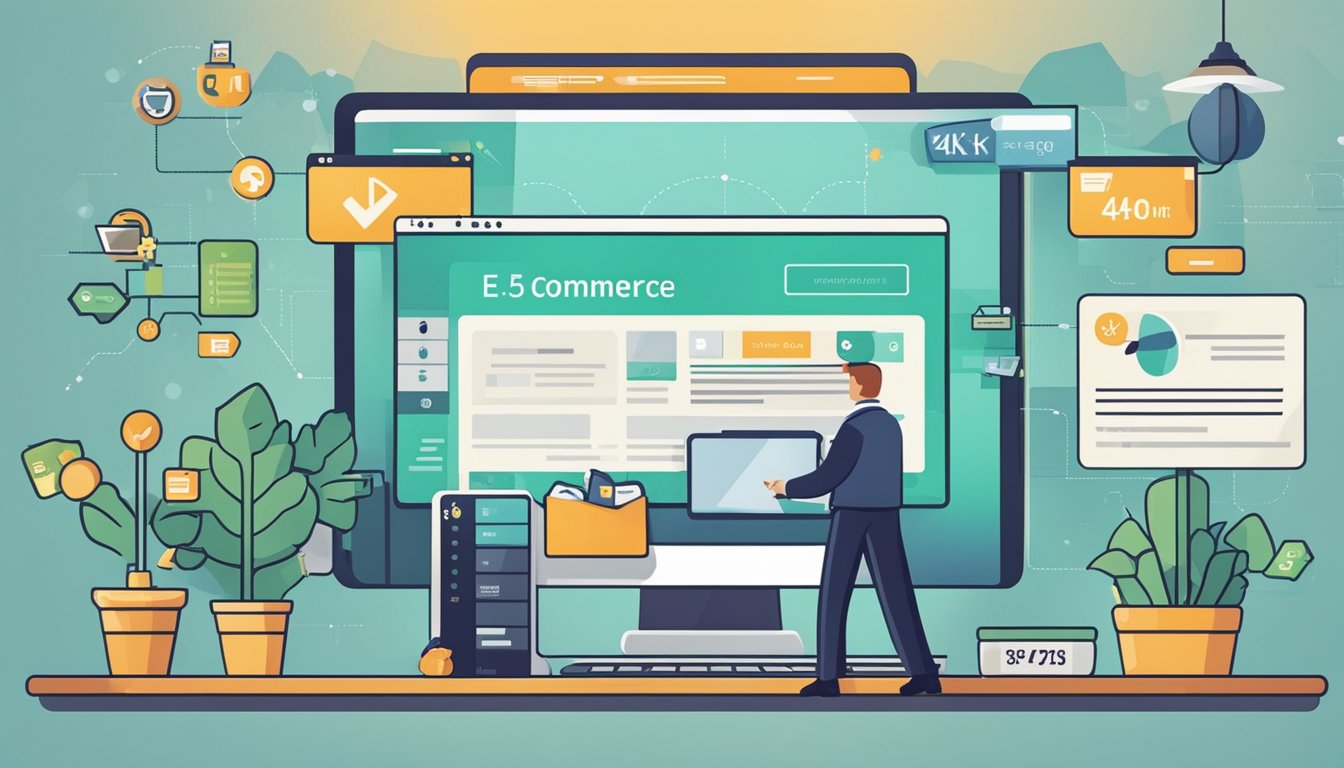Create a Successful Ecommerce Platform with Custom Software Development Expert Tips and Strategies
Creating a successful e-commerce platform is crucial for businesses in today's digital age. With the rise of online shopping, having a robust and user-friendly e-commerce platform is essential to attract and retain customers. Custom software development for e-commerce is an effective way to create a unique and tailored platform that meets the specific needs of your business and customers.

Understanding e-commerce platforms and choosing the right e-commerce development platform is the first step towards building a successful e-commerce platform. Key features such as user-friendly interface, secure payment gateway, and easy navigation are essential for a successful e-commerce platform. Custom software development for e-commerce can help businesses achieve these features and more.
Key Takeaways
- Understanding e-commerce platforms and choosing the right development platform is crucial for building a successful e-commerce platform.
- Key features such as user-friendly interface, secure payment gateway, and easy navigation are essential for a successful e-commerce platform.
- Custom software development for e-commerce can help businesses achieve these features and more.
Understanding E-Commerce Platforms

As someone who has developed custom e-commerce solutions, I understand the importance of selecting the right e-commerce platform for your online retail business. An e-commerce platform is a software application that allows businesses to create an online shopping website. It provides a range of features, including product cataloging, payment gateway integration, and order management.
When selecting an e-commerce platform, it is important to consider the following factors:
-
Scalability: As your business grows, your e-commerce platform should be able to handle the increased traffic and sales volume. It is important to select a platform that can scale with your business.
-
Customization: While many e-commerce platforms offer a range of features out-of-the-box, it is important to consider how customizable the platform is. Customization allows you to tailor your e-commerce site to your specific business needs.
-
Integration: Your e-commerce platform should integrate with other tools and services you use, such as payment gateways, shipping providers, and marketing automation tools.
-
Security: Your e-commerce platform should be secure to protect customer data and prevent fraud.
-
Ease of use: Your e-commerce platform should be easy to use for both you and your customers. A complicated checkout process can lead to cart abandonment and lost sales.
There are a variety of e-commerce platforms available, ranging from open-source solutions like Magento and WooCommerce to hosted solutions like Shopify and BigCommerce. Each platform has its own strengths and weaknesses, so it is important to evaluate them based on your specific business needs.
In my experience, custom e-commerce development can provide a more tailored solution for businesses with unique requirements. A custom e-commerce website can be designed and developed from scratch to meet your specific business needs, providing a more personalized shopping experience for your customers.
Overall, selecting the right e-commerce platform is crucial to the success of your online retail business. Consider the factors mentioned above and evaluate each platform based on your specific needs to make the best decision for your business.
Choosing the Right E-Commerce Development Platform

When it comes to creating a successful e-commerce platform, choosing the right development platform is crucial. There are many options available, each with its own strengths and weaknesses. Here are some popular options to consider:
Shopify
Shopify is a popular e-commerce platform that offers a range of features and integrations. It is user-friendly and easy to set up, making it a great option for beginners. However, it can be expensive, especially if you need to use third-party apps to add more advanced features.
Magento
Magento is a powerful open-source e-commerce platform that offers a lot of flexibility and customization options. It is a great option for larger businesses with more complex needs. However, it can be more difficult to set up and maintain than other platforms, and may require more technical expertise.
WooCommerce
WooCommerce is a popular e-commerce plugin for WordPress. It is easy to set up and use, and offers a lot of flexibility and customization options. However, it may not be the best option for larger businesses with more complex needs.
BigCommerce
BigCommerce is a cloud-based e-commerce platform that offers a range of features and integrations. It is a great option for businesses of all sizes, and offers a lot of flexibility and customization options. However, it can be more expensive than other platforms.
Wix
Wix is a website builder that also offers e-commerce functionality. It is easy to use and offers a range of features and integrations. However, it may not be the best option for larger businesses with more complex needs.
Squarespace
Squarespace is another website builder that offers e-commerce functionality. It is easy to use and offers a range of features and integrations. However, it may not be the best option for larger businesses with more complex needs.
Custom Ecommerce Development
Custom ecommerce development offers the most flexibility and customization options, but can be more expensive and time-consuming than using an existing platform. It is a great option for businesses with unique needs or for those who want complete control over their platform.
When choosing an ecommerce development platform, it is important to consider your business's needs and goals. Consider factors such as cost, ease of use, scalability, and customization options. Don't be afraid to try out different platforms to see which one works best for you.
Key Features for a Successful E-Commerce Platform

As a custom software development expert, I know that creating a successful e-commerce platform requires a combination of various key features. Here are some of the most important features that you should consider when developing your e-commerce platform:
User Experience
The user experience is the most important aspect of any e-commerce platform. It should be easy to navigate, visually appealing, and provide a seamless shopping experience. You should ensure that your platform is mobile-friendly and accessible to all users.
Customization
Customization is crucial to make your e-commerce platform stand out. Your platform should be customizable to meet the unique needs of your business. You should be able to customize your storefront, product listings, category pages, and more.
Payment Gateway
Your e-commerce platform should have a secure and reliable payment gateway. It should accept multiple payment methods and be integrated with popular payment gateways like PayPal, Stripe, and Square.
Integration
Your e-commerce platform should be integrated with other tools and applications that you use. It should be able to integrate with your ERP, CRM, and other essential tools.
SSL Certificate
Your e-commerce platform should have an SSL certificate to ensure secure transactions. It will protect your customers' sensitive data and build trust in your platform.
SEO
SEO is essential to drive organic traffic to your platform. Your platform should have built-in SEO tools to optimize your product listings, category pages, and homepage for search engines.
Inventory Management
Your e-commerce platform should have a robust inventory management system. It should be able to track your inventory levels, update stock availability, and manage your orders.
Mobile App
Your e-commerce platform should have a mobile app to provide a seamless shopping experience for your customers. It should be available on both iOS and Android platforms.
Social Media Integration
Your e-commerce platform should be integrated with social media platforms like Facebook, Instagram, and Twitter. It will help you to reach a wider audience and promote your products.
Personalization
Personalization is crucial to provide a unique shopping experience for your customers. Your platform should be able to personalize product recommendations, promotions, and other marketing messages.
Scalability
Your e-commerce platform should be scalable to meet the growing needs of your business. It should be able to handle a large number of products, orders, and traffic without compromising the user experience.
Dropshipping
Dropshipping is an excellent way to expand your product offerings without holding inventory. Your e-commerce platform should be able to integrate with popular dropshipping platforms like Oberlo and AliExpress.
CRM
Your e-commerce platform should have a robust CRM system to manage customer relationships. It should be able to track customer interactions, manage customer data, and provide insights into customer behavior.
In conclusion, a successful e-commerce platform requires a combination of various key features. By incorporating these features into your platform, you can provide a seamless shopping experience for your customers and grow your business.
Custom Software Development for E-Commerce

As an experienced developer, I know that custom software development is the key to creating a successful e-commerce platform. Custom development allows businesses to create a website that reflects their brand and values while offering customers a user-friendly and seamless shopping experience. Working with a development team that specializes in ecommerce software is crucial to ensure that the custom ecommerce development process is successful.
When it comes to ecommerce development, there are several factors that businesses need to consider. One of the most important factors is mobile optimization. With more and more customers shopping on their mobile devices, it's essential that ecommerce websites are optimized for mobile use. This means that the website should be responsive and easy to navigate on a small screen.
Another important factor to consider is social platforms. Social media is a powerful marketing tool for ecommerce businesses, and integrating social platforms into the ecommerce website can help drive traffic and increase sales. By allowing customers to share products on social media, businesses can reach a wider audience and increase brand awareness.
In addition to mobile optimization and social platforms, businesses also need to consider the type of ecommerce website they want to create. B2B ecommerce websites have different requirements than B2C or C2B websites. Businesses need to consider their target audience and tailor their website to meet their needs.
Finally, businesses need to work with a development team that has experience in custom ecommerce solutions. Custom development allows businesses to create a website that is unique and tailored to their needs. The development team should work closely with the business to understand their requirements and create a website that meets their needs.
In conclusion, custom software development is essential for creating a successful e-commerce platform. Businesses need to consider factors such as mobile optimization, social platforms, and the type of ecommerce website they want to create. Working with a development team that specializes in ecommerce software is crucial to ensure that the custom ecommerce development process is successful.
Frequently Asked Questions

What are the top ecommerce platforms for custom software development?
There are several ecommerce platforms available for custom software development, including Magento, Shopify, WooCommerce, and BigCommerce. Each platform has its own unique features and benefits, so it's important to evaluate your business needs and choose the platform that best suits your requirements.
What are the benefits of custom ecommerce development?
Custom ecommerce development allows businesses to create a platform tailored to their specific needs, providing a unique user experience and competitive advantage. Custom development also allows for greater flexibility and scalability, as well as the ability to integrate with third-party services and applications.
How important is user experience in creating a successful ecommerce platform?
User experience is critical to the success of an ecommerce platform. A well-designed and intuitive user interface can increase engagement, reduce cart abandonment, and ultimately drive sales. It's important to prioritize user experience in the development process and continually optimize based on user feedback.
What are the essential features to include in an ecommerce storefront?
Some essential features to include in an ecommerce storefront include a user-friendly interface, fast load times, secure payment processing, detailed product descriptions, customer reviews, and easy checkout. It's also important to provide personalized recommendations and upsell opportunities to increase revenue.
How can I ensure the security of my ecommerce platform?
Security should be a top priority for any ecommerce platform. Some best practices include implementing SSL encryption, using secure payment gateways, regularly updating software and plugins, and conducting regular security audits. It's also important to educate employees and customers on best security practices.
What are some best practices for optimizing an ecommerce platform for search engines?
Optimizing an ecommerce platform for search engines can increase visibility and drive traffic to the site. Some best practices include conducting keyword research, optimizing product descriptions and metadata, creating a sitemap, and building high-quality backlinks. It's also important to regularly monitor and analyze website traffic to make data-driven improvements.

We are committed to delivering a new level of automation that will help organizations save time, money, and staffing resources.
 WRITE FOR US!
WRITE FOR US!
